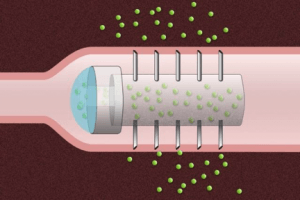Time has shown that the use of nanotechnology in the medical field is on an exponential rise. One result of this progress is an innovative and effective drug-delivery system. Researchers at MIT and Massachusetts General Hospital have devised a capsule that uses micro-needles to inject a payload of drugs into the gastrointestinal wall. This novel approach could very well replace injections.

When the capsule reaches its desired location in the gastrointestinal tract, the pH coating dissolves, and the capsule delivers its payload.
Image credit: Christine Daniloff/ MIT, based on images by Carol Schoellhammer and Giovanni Traverso
This drug-delivery system arose out of patient demand for orally administered therapeutics. Given a choice, patients would rather take a drug orally rather than by subcutaneous injection. However, digestion in the stomach could threaten the effectiveness of drugs with large molecules because they get dissolved before proper absorption (1).
In respect to this, Schoellhammer, Traverso, and their colleagues devised an ingestible capsule that could prevent the degradation of drugs and allow proper absorption of those drugs. Their prototype pill was 2 centimeters long and 1 centimeter in diameter, and it was coated in tiny stainless steel needles about 5 millimeters long. The pill included a drug reservoir to hold the therapeutic payload and a pH responsive coating to ensure that the payload is released at the desired location (2).
While in the intestine, the pH responsive coating would dissolve, revealing the micro-needles. Peristaltic motion of the gastrointestinal tract would compress the drug reservoir, which would expel the drug out of the needles and into the tissue.(2).
The researchers initially hypothesized that the micro-needles would do no harm to the patient because studies have shown that ingestion of such small, sharp objects would not result in tissue damage. Furthermore, the gastrointestinal tract has no pain receptors, so the patient would not feel pain during the internal injection (1).
In vivo studies included testing the pill on pigs with insulin as the drug payload. The capsule successfully delivered its payload in its intended fashion. The blood glucose of the pig dropped robustly, which indicates very effective absorption of insulin. Insulin delivered through this new drug-delivery system proved significantly more effective than the standard injection method (2).
The team of researchers seeks to use their novel drug-delivery system for other biopharmaceuticals such as antibodies that they intend to use to treat cancer and other maladies such as Crohn’s disease. They are also working with needles composed of degradable polymers and sugars. Progress has shown that further modification of this delivery system is indeed eminent, but only time will reveal the direction of this progress (2).
Sources:
1. Massachusetts Institute of Technology (Oct 1 2014). New drug-delivery capsule may replace injections. ScienceDaily. Retrieved October 6, 2014 from www.sciencedaily.com/releases/2014/10/141001102723.htm
2. Trafton A (1 Oct 2014). New drug delivery sapsule may replace injections. MIT News. Retrieved October 6, 2014 from http://newsoffice.mit.edu/2014/microneedles-drug-delivery-capsule-1001